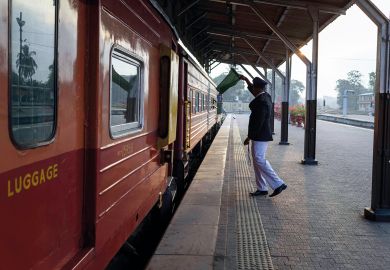Here in Oxford we do not need telling that tourism is a major feature of modern life. A babel of languages and hordes of rucksack-carrying foreigners make movement along the pavements difficult. But we cannot complain too much because the industry is now Oxfordshire's biggest employer since the Cowley Works have almost abandoned vehicle manufacture and the educational world is too reliant on public expenditure to promise much in the way of future employment.
Oxford is not so unusual in this. Tourism now accounts for one in 15 jobs worldwide and it continues to expand apace. It is well known that nations like Greece, Portugal and Spain have placed great emphasis on tourism as a means of economic development. Characteristically these countries have around 30 per cent of their workforce in the tourist industry. We may not have reached these levels yet in Oxford, but with little alternative employment envisaged we are well on the way. And as traditional industries collapse, it is becoming evident that many regions see economic salvation in following the same route. Hence County Durham, once synonymous with shipyards and collieries, now advertises itself as a Heritage centre, nothing less than the home of the Prince Bishops and a site of outstanding natural beauty. If former pit workers want a job, they are now advised to look to hotel management, to become waiters or, ironically, guides to show tourists around redundant industrial plants now resurrected as museums. This is indeed the likeliest and unkindest of post-industrial futures.
Given such a prospect it is not surprising that a great deal of interest has been generated in tourism from within and without educational services. Nowadays one can even read for a degree in the subject, though this is predominantly a matter of training prospective managers for the industry. There is a burgeoning managerial literature on "how to do" tourism coming from these interested parties. The necessary but dull requirements of tourist management have encouraged a great deal of writing on topics such as how to choose a tourist location, how to handle employees and how to maximise returns on investment. There are many opportunities for academic entrepreneurs here, and, inevitably perhaps, this leads to there being opportunists eager to create careers for themselves by uncritically addressing the needs of this industrial sector.
However, out of this expanding situation there has come some exciting work. John Urry's splendid The Tourist Gaze (1990) led the field in convincing intellectuals to take the growth of tourism seriously. Chris Ryan's book, Researching Tourist Satisfaction, also deserves praise. It is a thorough guide to techniques of researching the tourist phenomenon. Essentially it is a social research methods course applied to tourism, but it is none the worse for that, since it is highly reliable and genuinely integrates studies of tourism with guidance on how to undertake the process oneself. Though I have misgivings about its focus on analysis of tourist satisfaction, the book will be essential for all tourism researchers.
Furthermore, the development of tourism has spawned several bodies with an interest in its examination. Prominent among these is the International Academy for the Study of Tourism established in 1988. The book edited by Richard Butler and Douglas Pearce is the result of a conference of the academy convened in Korea. It scarcely hangs together as a whole, though there are several worthy contributions, since the authors are from a wide variety of disciplines with very different interests.
However, what is shared and what makes tourism an especially fascinating subject is that it is now so central a feature of how we live and how we feel about ourselves. This is not just a matter of the plethora of tourist sites we encounter just about everywhere, nor is it simply that in most parts of Europe at least we can scarcely avoid tourists. It is that tourism is increasingly perceived as a right of citizenship in the late 20th century. No matter that historically travelling for leisure is a novelty, the fact remains that nowadays not to have a holiday away from home is an index of deprivation and social exclusion: for very many people, having a holiday is a key defining element of their very being. Yet it was only a few years ago that people began saying that they "need a holiday". This continues today, but it has extended to an insistence on a need for two or more vacations away from home for almost one in four of the more fortunate British subjects, and enjoyment of "weekend breaks" in the Cotswolds or the Lake District is now quite routine among the middle classes.
Roger Sheldrake understood this well enough when he decided to make tourism his doctoral subject. It "suddenly struck me", he reports in (David Lodge's) Paradise News, that "tourism is the new world religion. Catholics, Protestants, Hindus, Muslims, Buddhists, atheists - the one thing they have in common is they all believe in the importance of seeing the Parthenon. Or the Sistine Chapel, or the Eiffel Tower." Lodge's novel remains the best source of understanding the significance of tourism today.
The spread of mass tourism triggered the first sustained social analyses. Once the plebs could afford to ride a charter flight to Benidorm and Majorca, then cultural critics such as Daniel Boorstin (1961) began to bemoan the artificiality of it all. The trouble with tourists is that they spoil the places they visit and none so much as the working classes. How vulgar are those Watneys pubs and concrete hostels on the Costa Brava. The only response from the sensitive is to avoid the despoiled regions and seek the untouched. Lately that has been places such as Peru and China.
The difficulty is that even cultured visitors threaten to ruin the authenticity of a place by their very presence. For a while in tourism studies there was much enthusiasm for the concept of "staged authenticity", a term that drew attention to the ways in which host communities put on special shows and manners to satisfy the tourist yearning to discover authentic experiences. Hence all those traditional costumes, local customs and celebration of provincial cuisine. Writers influenced by Dean McCannell (1976) made much of this facade, while they still held to a notion that the authentic could be found if the diligent tourist looked behind the pomp: "away from the hotel we found this delightful little restaurant . . ."
Post-modern sceptics have buried this idea. There is no authenticity waiting to be found. The very establishment of tourism destroys it and, anyway, even the most primitive taverna has a fridge, microwave and imported beers. And who really wants the authentic on holiday: earth closets, straw bedding, undrinkable water . . . no facility for credit cards? Today tourists more commonly revel in the inauthenticity of the experience: they know the whole thing is a pretence, but still they enjoy it. That is surely the secret of Disney, but it is much the same the world over. The tourists whom sociologist Eugenia Wickens studies in Greece are probably typical: whether they are Shirley Valentines, ravers, or sun-worshippers, they are above all after sensual pleasures. So long as rules can be temporarily suspended, the sun shines and the hotel comforts are assured, then they can have what they want - a good time free from obligations and constraint. Boorstin may not like it, but this, it seems, is what the majority of post-modern tourism is about (and I am not going to the Parthenon until I can be guaranteed an air-conditioned bus to take me there from the hotel, and clean toilets).
But one caveat. All this talk of an age of the tourist needs to be set against what might be called the Mitterrand warning. A few years ago the French president, put on the defensive by critics of restrictions he intended to place on French tourists, reminded his public that fully 40 per cent of French people did not take a holiday in any one year. This, be it noted, in the most popular holiday destination in Europe. In Britain about one in ten people gets three or more holidays away from home a year, and almost 60 per cent take at least one. That leaves, of course, four in ten who get nothing. My guess, suggested by a reading of Linda Richter's excellent chapter in Butler and Pearce's collection, is that a disproportionate number of these people are victims of recession who, if lucky, are just making a living in poorly paid and casual jobs in the tourist industry.
Frank Webster is professor of sociology, Oxford Brookes University.
Change In Tourism: People, Places, Processes
Editor - Richard Butler and Douglas Pearce
ISBN - 0415 11486 1
Publisher - Routledge
Price - £40.00
Pages - 252pp
Register to continue
Why register?
- Registration is free and only takes a moment
- Once registered, you can read 3 articles a month
- Sign up for our newsletter
Subscribe
Or subscribe for unlimited access to:
- Unlimited access to news, views, insights & reviews
- Digital editions
- Digital access to THE’s university and college rankings analysis
Already registered or a current subscriber? Login



